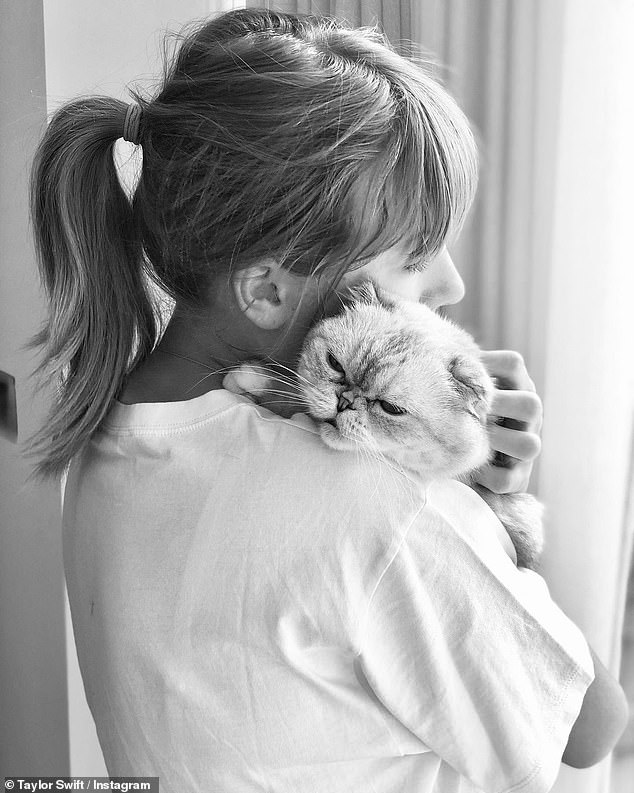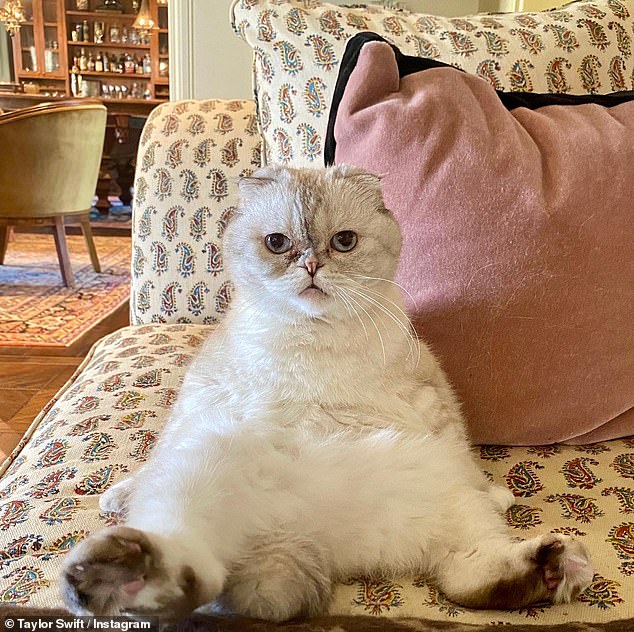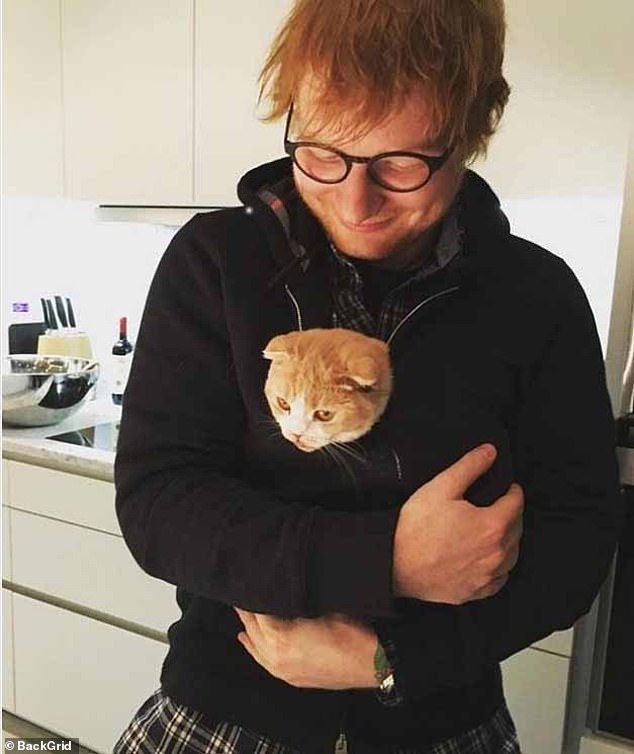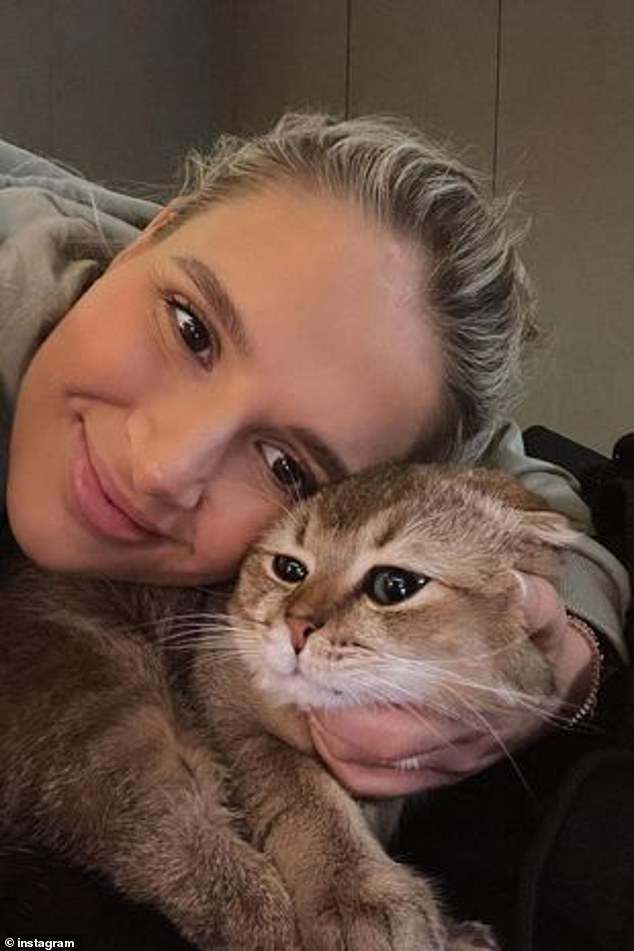Scientists reveal the shocking reason why designer cats, made popular by celebrities from Taylor Swift to Molly-Mae Haag, could be BANNED
A designer cat favored by celebrities from Taylor Swift to Molly-Mae Haag could be banned after a government report found they experience ‘painful’ conditions.
The Scottish Fold cat is known for its unique appearance with a round, ‘owl-like’ face and small folded ears.
However, scientists say the cute facial features that have earned so much admiration on social media are condemning these cats to a shortened life of near-constant pain.
The genes that give the Scottish Fold its unique appearance also cause defective cartilage formation, leading to crippling pain when running, jumping or playing, leaving many almost unable to move.
But despite their known health problems, the breed’s popularity has soared thanks to the support of some of the world’s biggest celebrities.
A new report from the Animal Welfare Committee (AWC), a body that advises the Department of Environment, Food and Rural Affairs, has called for a ban on the breed.
Dr. Dan O’Neil, associate professor of companion animal epidemiology at the Royal Veterinary College, told MailOnline: ‘There is no doubt that breeding Scottish Fold cats leads to a lifetime of incurably paralyzing suffering from the disease mutations that define these cats.
‘There is an argument that the definition of a Scottish Fold cat is itself a disease description.’
Scottish Folds are a designer cat breed favored by celebrities like Taylor Swift, but scientists say the breed poses health problems that could lead to their banning. In the photo, Taylor Swift (left) poses with Paula Abdul (right) and her Scottish Fold cat
Like many purebreds, the Scottish Fold experiences a number of health problems related to inbreeding and the forced selection of aesthetically pleasing or ‘cute’ traits.
This includes the skeletal disorder osteochondrodysplasia which leads to deformities such as thick, inflexible tails and shortened, splayed feet.
Dr. O’Neil says: ‘The Scottish Fold cat breed was invented by deliberately breeding cats with a serious genetic disease mutation that now affects all cats of this breed.
‘This osteochondrodysplasia mutation changes the way their cartilage is formed and gives Scottish Fold cats their characteristic folded ears.
‘But the folded ears are the tip of an iceberg of suffering, including skeletal deformities and severely painful arthritis.’
Cats with this condition are unable to live full, healthy lives because they cannot move properly or even exhibit normal cat body language.
Dr. O’Neil adds: ‘Many people consider Scottish Folds to have ‘calm’ and ‘laid-back’ personalities, but this behavior may reflect a lifetime of joint pain.
‘Their reluctance to move, jump and play has less to do with a calm personality and more to do with the fact that it is too painful to behave like a normal cat.’

The same gene that gives Scottish Folds their soft ears also causes bone deformities and arthritis. The government’s animal welfare organization is now calling for a ban on the breeding of these animals. In the photo: Taylor Swift and her Scottish Fold

Because the gene that causes Scottish Folds to develop arthritis is dominant, any offspring from their breeding will also develop the condition. This leads to the mistaken belief that they are naturally quiet, when in reality they are in too much pain to play or run. In the photo: Taylor Swift’s Scottish Fold
In the case of the Scottish Fold, these harmful traits are particularly problematic because they are transferred to a dominant gene.
When two animals reproduce, their offspring will always exhibit the dominant gene, even if only one parent carries it.
Dr. Alison Richards, head of clinical services at Cats Protection, told MailOnline: ‘This painful degenerative joint disease is common in Scottish Folds, and they will often develop arthritis.
‘Many of these cats will suffer a lifetime of pain because of their selective breeding, but because they are masters of disguise, they usually hide this from us and suffer in silence.’
For example, in humans, brown hair is usually caused by a dominant gene, so children will often have brown hair if only one parent is brunette.
Likewise, if a single parent is purebred, all offspring of a Scottish Fold cat will inevitably develop these painful and debilitating conditions.
This also means that Scottish Fold health problems cannot be solved by selective breeding.
Dr. Richards points out that Scottish Folds develop arthritis so reliably that they are used as a model to study how the condition develops in humans.
But despite these health problems being well known, the popularity of Scottish Fold has only increased in recent years.
Earlier this year it was estimated that one per cent of Britain’s 10.6 million cats could be Scottish Folds, with the breed making up three per cent of all cats purchased last year.
A spokesperson for the RSPCA told MailOnline: ‘There is also an increasing demand for cats bred with exaggerated characteristics, such as the Scottish Fold, Persian or Munchkin breeds, but unfortunately all of these breeds are prone to health problems.
‘Unfortunately, cat breeding is becoming an increasingly accessible and lucrative activity, but there are no legal safeguards to protect cats like there are currently for dogs.’
This demand is partly driven by the publicity these exaggerated breeds receive in the media and in celebrities’ social media feeds.
Taylor Swift’s two Scottish Fold cats, Olivia Benson and Meredith Gray named after characters from American TV shows, often appear on her social media accounts.
Ed Sheeran also owns a Scottish Fold called Callipo, which has its own Instagram page.
And Molly-Mae Haag owns two of the breed called Eggy and Bread.

Despite the health problems being well known, Scottish Folds have become more popular, partly due to the ownership of celebrities such as Ed Sheeran (pictured)

Molly-Mae Haag owns two of the breed called Eggy and Bread (pictured)
A spokesperson for the Scottish RSPCA told MailOnline: ‘The inclusion of animal breeds with extreme conformational characteristics, hereditary diseases or negative behavioral traits that cause significant animal health and welfare issues in the film and TV industry unfortunately draws attention to those species and encourages the public to think these animals are a good pet choice.
‘This could then lead to increased demand for that particular breed and then some unscrupulous breeders will seize the opportunity to put profit before animal welfare.’
However, that increase could soon come to an end if the government decides to ban the breeding of Scottish Folds.
The AWC report singles out Scottish Folds as a possible target for a ban due to their inevitable health problems.
This step is supported by Cat Protection, which calls on the government to ‘urgently introduce regulations’.
Earlier this year, a Cats Protection petition calling for the regulation of cat breeding received more than 50,000 signatures.
Dr. Richards concludes: ‘We want a ban on the commercial breeding of certain breeds with extreme characteristics, such as the Scottish Fold, the Munchkin and the so-called XL bully cats, as well as regulation of cat breeding in general.’
Likewise, the Scottish RSPCA says it does not support the breeding of Scottish Folds.

There are now increasing calls to ban the breeding of Scottish Folds under animal welfare laws. In the photo: Tommy Furry with Molly-Mae Haag’s Scottish Fold
The AWC has recommended a ban on licensing laws to prevent the breeding of Scottish Folds in Britain.
The report points to existing bans on the breeding and sometimes even the sale of cats in countries such as Austria, Belgium and Norway.
The report’s authors write: ‘Breeds should not be maintained if they suffer from health and welfare problems related to characteristics selected for or associated with that breed.
‘Licensing legislation should explicitly prevent those who breed these animals from obtaining licenses across Britain.’
